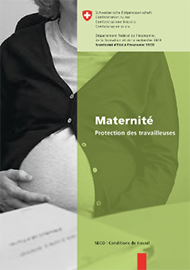As soon as you announce your pregnancy, you will benefit from protective measures and specific rights.
Protective measures and rights
| Protection against dismissal
| Health protection
| Maternity leave
| Federal Act on Gender Equality: prohibition of discrimination
Protection against dismissal
Throughout the pregnancy and the 16 weeks following childbirth, the employing entity cannot dismiss an employee, subject to motives leading to immediate dismissal for valid reasons (Code des obligations, art. 336c).
During the trial period, the employing entity can terminate the contract at any time at seven days’ notice. The notice is in principle valid, the validity of the dismissal can however be disputed in virtue of the Federal Act on Gender Equality.
If you are pregnant and have a fixed-term contract, the latter will terminate on the date agreed upon in the contract. If you give birth during the period covered by the contract however, the latter will be extended until the last day of the maternity leave.
Health protection
Dangerous or forbidden tasks
Pregnant women and breastfeeding women cannot perform dangerous or difficult tasks unless a risk analysis has established that there is no threat to the health of the mother or child, or appropriate protective measures have been taken.
See :
- Ordonnance 1 relative à la loi sur le travail (art. 62) and Ordonnance sur la protection de la maternité
- UNIL Employees: Directive 1.38 of the University of Lausanne Rectorate Protection de la santé des personnes enceintes et allaitantes - To get more information or advice, contact UniSEP's pregnancy protection specialists
Working hours and schedules
As from the beginning of the pregnancy, the maximum daily working time is nine hours. Subsequently, other restrictions apply for activities that are mainly carried out in a standing position.
During the first seven months of pregnancy, a woman who works between 20:00 and 6:00 can request to do equivalent work during the daytime. During the eight weeks preceding childbirth, nightwork is forbidden.
See :
- Loi fédérale sur le travail dans l’industrie, l’artisanat et le commerce (art. 35a et 35b)
Absences, salary and holiday entitlement
During your pregnancy, you can, upon simple notification, either not go to work or leave your working place. As in the event of illness or accident, your salary will be paid for a limited period of time if a medical certificate proves that you are unable to work due to your pregnancy.
For UNIL staff with a permanent employment contract, the salary is paid 100% for the first 12 months and 80% for the three following months. During the trial period, the salary is paid for one month maximum. For UNIL staff with a fixed-term contrat, the salary is paid:
- the 1st year for one month.
- the 2nd year for two months.
- the 3rd year for four months.
In the event of pregnancy, the holiday entitlement is maintained. However, the employing entity can reduce the duration of your holidays if you have been unable to work for more than two complete months per calendar year due to your pregnancy. The reduction thus does not start until after the 3rd month of absence.
See :
- Loi fédérale sur le travail dans l’industrie, l’artisanat et le commerce (art. 35a)
- The Code of Obligations (art. 324a and 329b)
- Etat de Vaud/ UNIL employees: Règlement d’application de la Loi sur le personnel de l’Etat de Vaud (PDF) (art. 58 and 65)
Maternity leave
The Loi fédérale sur les allocations perte de gain stipulates that any mother engaged in gainful employment at the time of childbirth is entitled to a maternity leave of 14 weeks, paid at the rate of 80 % of the salary, on the following cumulative conditions:
- She has paid AVS contributions during the nine months of pregnancy (shorter periods in the case of premature childbirth).
- She has been engaged in gainful employment for at least five months during the pregnancy.
- She has an employment contract at the time of childbirth.
If these conditions are not fulfilled, the salary will be paid according to the same regulations as in the case of incapacity for work.
Cantonal provisions, personnel regulations and collective employment agreements may stipulate more generous benefits. This is notably the case for UNIL staff (except Student Assistants): during their maternity leave (4 months) and their breastfeeding leave (1 month), staff members receive their full salary.
See :
Federal Act on Gender Equality: prohibition of discrimination
The Federal Act on Gender Equality, which came into force in 1996, aims to implement the principle of equality between men and women in the field of employment. It prohibits any form of discrimination - direct or indirect – between male and female employees on account of their gender, especially in relation to civil status, family situation or, in the case of women, pregnancy.
This prohibition applies throughout the employment relationship, from recruitment to termination of contract, and concerns all domains: particularly the allocation of tasks, organisation of working conditions, remuneration, professional training and development, promotion and termination of employment.
Since it is very difficult to prove discrimination, the law stipulates a reduced burden of proof to provide by the person concerned. As long as the female worker can render the discrimination plausible, the employer has to prove that no discrimination has been committed. The reduction of the burden of proof does not apply to discrimination at the recruitment stage however.
For instance, it is considered discriminatory
- To offer a less interesting and less-well paid job to a female employee who is returning to work after maternity leave.
- Not to employ a woman because she is pregnant or could become pregnant.
Please note that during the job interview, the female worker is not obliged to spontaneously announce a pregnancy nor to reply to questions regarding the possibility of a current or future pregnancy, as long as the latter has no significant effect on the work performance or safety of the mother.
See/Read :

